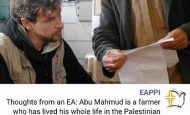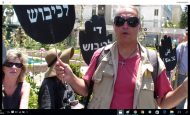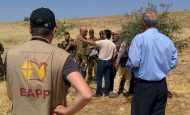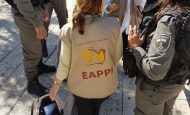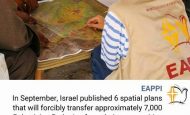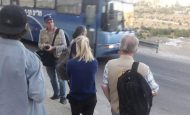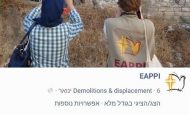Skip to content
A Fact Sheet on Ecumenical Accompaniment Programme in Palestine and Israel (EAPPI)
Background
- EAPPI was founded in 2002 by the Geneva-based World Council of Churches (WCC) and is considered to be the WCC’s flagship project on the Arab-Israeli conflict.
- EAPPI is not a registered organization in Israel or abroad.
- This program brings international activists to the West Bank through the ruse of tourist visas. The stated mission is to “witness life under occupation, engage with local Palestinians and Israelis pursuing a just peace, to change the international community’s involvement in the conflict, urging them to act against injustice in the region.”
- Since 2002, EAPPI has brought 1,500 “Ecumenical Accompanier” volunteers/activists to Israel for periods of three months at a time. These activists receive training prior to their arrival, which includes an overview of the program itself, methods for coping with the army and police, and different ways of surpassing Israeli airport security and customs officials in order to successfully enter the country.
- EAPPI’s advocacy goal is to “We share our eyewitness testimonies with faith leaders, decision makers, media, civil society, and business officials, so that they change public policy toward ending the Israeli occupation and achieving peace in Israel and Palestine.” [emphasis added.]
- The activists wear brown vests with the organization’s logo, and are deployed at checkpoints, points of friction between Israelis and Palestinians, and between Palestinians and the IDF – including in the Old City of Jerusalem. The activists additionally attend events and activities commemorating the Palestinian “Nakba” (catastrophe).
- The activists cooperate with other political NGOs (non-governmental organizations) operating in the West Bank. For example, one EAPPI activist claimed that during his activity at the checkpoints “we also worked with Israeli peace groups like Breaking the Silence and New Profile.”
- Upon returning to their home countries, many EAPPI activists use their experience in the West Bank to promote anti-Israel campaigns, including promoting BDS (boycott, divestment, and sanctions) (see below).
- Since churches serve as “sending organizations” to the EAPPI program, the program’s alumni are then able to further strengthen the pro-Palestinian narrative in such churches around the world.
- EAPPI maintains a local program office located in St. Anne’s Church in Jerusalem (property of the French government), and also has salaried program managers in Israel.
- EAPPI does not release financial details regarding the project, reflecting a lack of transparency and accountability. In 2015, WCC provided a $1.5 million grant to the program, including $1 million for “Ecumenical Accompaniers” from Australia, Austria, Denmark, Finland, Germany, Ireland, New Zealand, Norway, Sweden, Switzerland, the United Kingdom, and the United States.
- In 2014, the Swedish-Norwegian branch of EAPPI requested $1.5 million from the UN’s Office for the Coordination of Humanitarian Affairs (OCHA-OPT).
Ideology and practices
- EAPPI regularly utilizes demonizing, and sometimes antisemitic, rhetoric against Israel.
- EAPPI only presents a one-sided, Palestinian narrative on its website, in its publications, and to its own activists. The organization further promotes the Palestinian “right of return,” and accuses Israel of “apartheid” and “war crimes.” They document only alleged Israeli infractions, and systematically ignore Palestinian terror.
- EAPPI’s core publication, “Faith under Occupation,” jointly published with WCC and the Jerusalem Inter-Church Centre (2012), places sole blame on Israel for the difficulties faced by Christians in the Holy Land.
- This document contains a list of recommendations entitled “50 Ways to Action for Peace and Justice,” including:
- “Practice using a clear and unambiguous vocabulary including language protesting apartheid and colonization.”
- “Strengthen network working on sanctions and suspension of US aid to Israel.”
- “Challenge Israel in local and international courts. (If you are a lawyer, donate your time and initiate cases).”
- “Join the campaigns for economic boycotts…join or initiate a campaign for cultural and academic boycott.”
- “Challenge the Zionist attempts to doctor Wikipedia.”
- “Engage in civil disobedience actions.”
- “Develop close working relationships with progressive parties and groups in your country.”
- “Reach out to Christian religious leaders and ask them to act based on the Kairos Palestine document.”
- The above referenced Kairos Palestine document (2009) calls for BDS against Israel, denies the Jewish historical connection to Israel in theological terms, and blames Israel alone for the continuation of the conflict.
- The document’s purpose is to rally churches globally to support anti-Israel BDS, delegitimization, and demonization. The Kairos document includes justification of terrorism against Israeli citizens, calling it “legal resistance”: “Some (Palestinian) political parties followed the way of armed resistance. Israel used this as a pretext to accuse the Palestinians of being terrorists and was able to distort the real nature of the conflict, presenting it as an Israeli war against terror, rather than an Israeli occupation faced by Palestinian legal resistance aiming at ending it.” [emphasis added.]
- For addition information, see:
Examples of Activists’ Activities Upon Return to their Home Countries
- One such activist blogged that, “The reports that my EU team filed … ultimately found their way into United Nations reports…the time I spent living in the West Bank was only half of the job. The other half is advocacy. Since returning home, I have maintained this blog, made presentations to church and community groups. Written letters to… politicians and joined with organizations and individuals working at the grass-roots level to end the Occupation.”
- In May 2016, at a public event in London, an EAPPI activist shared her experience in Hebron. Among other things, she blamed the “Jewish lobby” and its influence in the United States as an explanation for “why Evangelical Christians are not as sympathetic to the Palestinian plight.” She also supported the Palestinian “right of return,” called for a complete boycott on products and services from Israel, and referred to Israeli killing of Palestinians in Hebron “that supposedly had knives, but there are videos that show they have been planted. “
- A South African EAPPI activist who had participated in the program twice advocated for targeting the Israeli banking system, calling for “SWIFT [international banking network] sanctions against Israel.” He stated that,
- “If we can develop the momentum of sanctions against Israeli banks then all the power of the Israeli military becomes irrelevant … that’s really the basis to support the BDS program… without access to SWIFT…. the whole economy would quickly collapse…Israel should comply with the nonproliferation treaty and abandon its nuclear weapons … release the political prisoners … end the occupation … Apply human rights for all within the area [Israel and Palestine] … The right of return of Palestinian refugees … the time has come to say that the victims of the Holocaust have now become the perpetrators”
